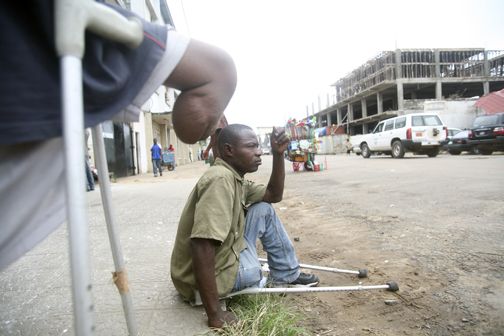David has his jeans rolled up where his right leg should be. He's working Randall Street, dodging traffic, trying to hit up his old standbys for his weekly handout of 5 Liberian Dollars. His first two attempts wield nothing. Then the jackpot: A woman at a kitchenware store hands him a 5. Security guards, who themselves make barely enough to feed their families, see David and give a little, but the relief is short-lived — two more storeowners who usually give are nowhere to be found.
At the next shop, a security guard sees David and Peter coming and hands them both a 5. But David had been by earlier and sees the man's generosity as a trick. He hands him back the money and whispers to me, "He's tryin' me to see if I take it." On the streets all a man has is his integrity.
Every Saturday from 10 to 11 a.m. a group of amputees limp through the downtown area — some on crutches, some in wheelchairs — asking store owners if they can spare 5 Liberian Dollars. Whatever the men collect they share amongst the group. This is the same group that begs outside Abi Jabi's, the local supermarket, during the week, taking turns holding the wooden box in the hopes of collecting enough money for an evening meal.
Seeing poverty in Africa is not surprising. Even seeing young men begging on the street for the equivalent of 10 cents is not a shock (it happens in New York City as well). But the part of this equation that baffles me, is that some of these young men who beg on Randall Street and sleep on the beach are the same youth who are praised and handed medals out on the soccer field. On the one hand they are outcasts, marginalized from the larger community for their role in the war and on the other hand they are held up as symbols of hope for their country and even sent to represent Liberia in soccer matches around the world.
I ask Reverend Jervis Witherspoon, the executive director of the National Commission on Demobilization, Disarmament, Rehabilitation, and Reintegration, who helped start the amputee soccer league and heads the commission who works with these young men, about this exact issue. His face turns serious as he answers. "If I was President I would do things differently," he says. "It looks bad that those guys are going around representing the country and they don't have work and their living on the beach. Even if we sit them behind a desk, it will keep them off the streets."
